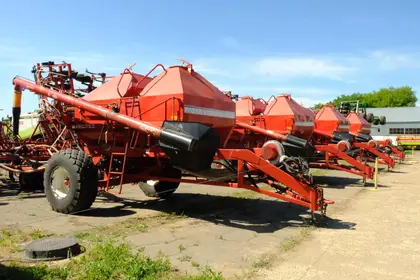Bohdan Vitvitsky chose his dream career when he entered the Ukrainian agribusiness in his early 20s. He is a highly intelligent and ambitious young man – a good fit for Ukraine’s dynamic agricultural sector.
It all seemed to be going to plan when Bohdan became Director of AFK – a business that generates up to 60,000 tons per year split evenly between grains and oils – before his 30th birthday.
JOIN US ON TELEGRAM
Follow our coverage of the war on the @Kyivpost_official.
But Russia’s invasion of Ukraine has changed virtually everything for Bohdan, his young family who have gone to safety outside Ukraine and his employer, the Kornatsky family. Now, he and the business worry not only about getting good prices for their harvest, but even getting it out of their 16,000 hectares of paddock to market. When he is not on the farm, Bohdan stands guard with his local Territorial Defense unit.

The farm is also in the firing line of Moscow’s strategy to weaponize food and energy.
During my visit to AFK near Pervomaysk in central-southern Ukraine, Arkady Kornatsky – the business group’s patriarch, former Ukrainian MP and Presidential candidate – explained the situation to me. According to Kornatsky, since the start of the full-scale invasion, fuel prices have not only soared but supplies of diesel to operate farm equipment have started drying up. AFK’s and other producers’ costs have doubled and the grain prices they receive have halved.
But farmers are resilient. So is Kornatsky and his managers. Fuel costs and lack of supply are a reality of agribusiness, even if made more pronounced by war. However, there is another factor out of Kornatsky’s control that threatens not only the viability of his family’s business – which includes wheat, corn, rapeseed, sunflowers, pork and garden vegetables – but the whole of Ukrainian agriculture.
Russia’s occupation and targeted destruction of Ukraine’s ports and agricultural exports is likely to lead to global food insecurity and price inflation over the next three months – the key period for northern hemisphere harvests.
The UN’s crisis coordinator on related issues this week told a Canadian media outlet: “The prices across the world are going up as much as 17 per cent. We see shortages of food in many parts of the world, especially in the Sahel of Africa, the Horn of Africa and other populous countries that depend on wheat as a staple food.”
Kornatsky, a strong believer in innovation who has even developed his own ‘portable’ swinery and micro-finance system for Ukrainian rural dwellers, believes that global capacity starts with local action. He says the first priority must be ensuring the sustainability of Ukrainian agribusiness and those who depend on it, such as the 320 staff on his family’s farm.
“Unlike many countries, we have never had any agricultural subsidies or support. If we don’t have sustainability through the war period, underpinned by the rule of law, there will be no Ukrainian agribusiness remaining. Then, [Vladimir] Putin will have achieved one of his genocidal goals,” Kornatsky argues.
The main response by the Ukrainian government to date has been the introduction of no-interest loans for agribusiness. AFK applied but did not receive a favorable response.
“We’ve never applied for any finance in the past. So, it was disappointing but not surprising to be rejected. But of greater concern is that it’s the wrong mechanism. Loans by their nature are selective and subjective. A base price is universal and transparent and something that all players can plan around,” Kornatsky, a public critic of government policy, states.
While the policy situation remains inadequate in Kornatsky’s view, the family’s farm managers have had to adjust to their new and challenging reality. They have put investment to improve the farm on hold.
Meanwhile, Vivitsky describes plans for an in-ground storage trench to hold up to 30,000 tons of grain from the upcoming July wheat harvest for up to six months. It is part of the farm’s attempt to ride out the current period of instability.
We visit the local village where Kornatsky was raised as a “Kolhospnyk” – member of a former Soviet collective farm who then went on to a successful legal and business career including many years based in Moscow. That success led Kornatsky to purchase the collective farm following Ukraine’s independence and transform it into a thriving concern. It is possible that the farm has utilized its logistical capabilities to contribute to defense efforts – all at its own expense.
At the local church, which Kornatsky is part funding the renovation of, we enter a small field outside the main gates.

“During renovations a few months ago, we found bones in shallow graves along this fence line,” Kornatsky says. “These people starved to death during [Joseph] Stalin’s forced famine on Ukrainians in the 1930s. But somehow people survived, the village survived and it will survive again, as will Ukraine.”
Ukraine has lost 25% of its arable yield area due to Russia’s invasion. However, officials are confident that internal needs can be met given displacement and external migration have lowered domestic demand. But that will be of little comfort to either producers under pressure or to African nations who import some 20 per cent of their wheat from Ukraine.
Before the war, Kornatsky had started an eco-project to dredge and clean up the Bug river which flows through his village.
“These things don’t happen by themselves. We have a responsibility to take care of and defend our land. That is what we are here for,” Kornatsky said, as his young manager stood by and thoughtfully listened.
You can also highlight the text and press Ctrl + Enter



